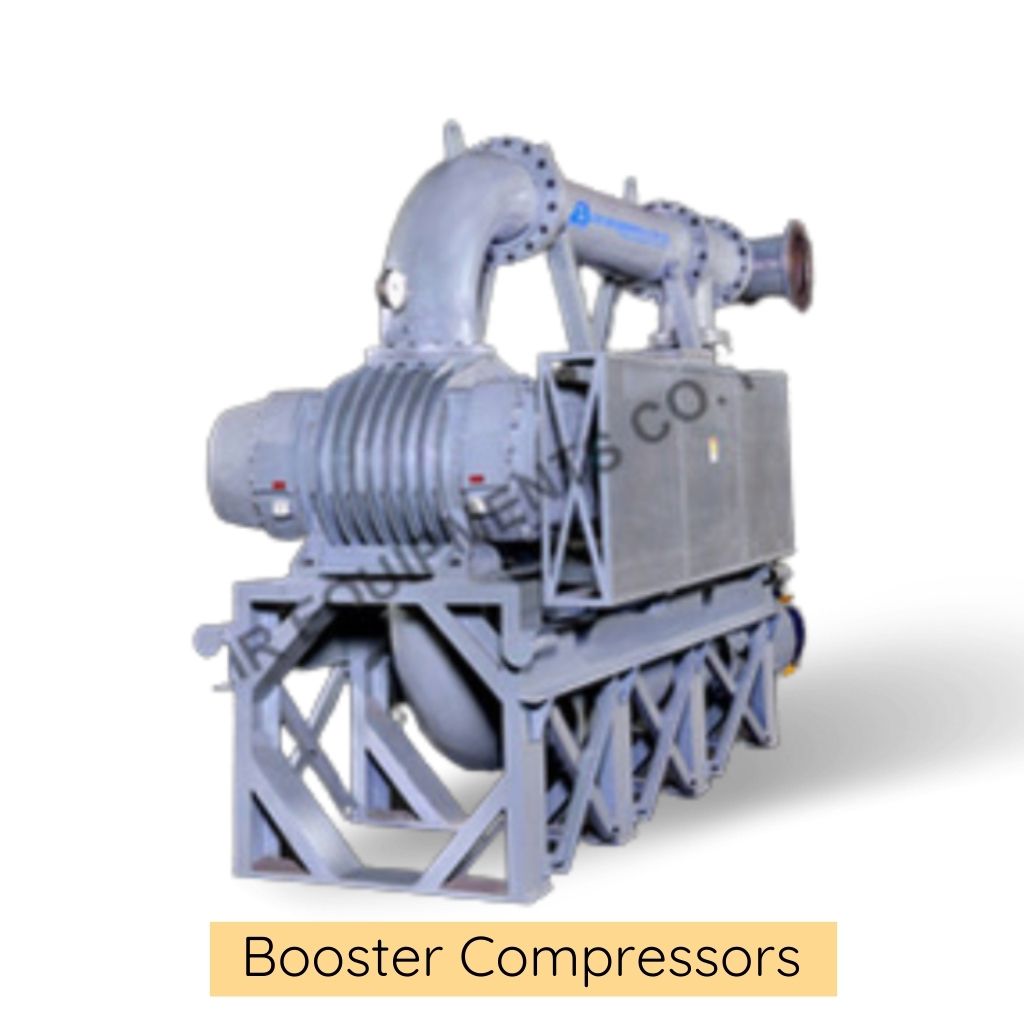Table of Contents
Gas boosters (also known as booster compressors) are devices designed to increase the pressure of gases, making them an indispensable component in industries and applications where high pressure is necessary. In systems that deal with gases like hydrogen, oxygen and nitrogen, gas booster compressors are essential in ensuring operational efficiency, safety and performance. However, these gases have different characteristics that require special considerations in their handling, especially in terms of compression and boosting.
This article provides a deep dive into the special considerations when using gas booster compressors for hydrogen, oxygen and nitrogen systems. Whether you’re working with a high-pressure gas booster for industrial processes or managing a more specific application, understanding the key aspects of gas boosting is crucial for achieving optimal performance and ensuring safety.
What Are the Key Special Considerations for Using Gas Booster Compressors in Hydrogen Systems?
Hydrogen, as a highly flammable and volatile gas, requires special attention when handled in high-pressure systems. The use of a gas booster compressor in hydrogen systems involves several important factors to ensure both safety and efficiency:
- Material Compatibility:
Hydrogen can cause embrittlement of materials, a process where metals lose their strength and become brittle when exposed to hydrogen. It is crucial to ensure that the gas booster compressor is made from hydrogen-compatible materials, such as stainless steel, to prevent any risk of failure due to hydrogen embrittlement. - Compression Rate:
Hydrogen is often compressed to very high pressures, sometimes exceeding 300 bar. The booster compressor must be designed to handle such high pressures effectively without causing leakage, system failure or safety hazards.
- Leakage Control:
Given hydrogen’s small molecular size, it can easily leak through seals and joints in the system. This makes the design of the booster compressor crucial in preventing leakage. Special sealing materials and double-seal systems are often required to ensure safe operation. - Ventilation and Safety Systems:
Since hydrogen is highly flammable, it is important to have proper ventilation systems in place to prevent the accumulation of hydrogen gas in confined spaces. Safety relief valves and explosion-proof systems should also be considered to avoid catastrophic accidents.

How Do Gas Booster Compressors Work in Oxygen Systems?
Oxygen systems also require careful handling due to the reactive nature of oxygen under high pressure. Here are the primary considerations when using a gas booster for oxygen:
- Material Selection for Oxygen:
Oxygen accelerates combustion and even the slightest contamination in the system can lead to dangerous fires or explosions. The compressor materials must be free of oils and other substances that could ignite under high pressure. Oxygen-compatible lubricants and materials are essential to prevent the risk of fire. - System Purity and Cleanliness:
Ensuring system cleanliness is paramount in oxygen systems. Any contamination, even dust or metal particles, can lead to ignition when the gas is under high pressure. Strict protocols should be followed for cleaning and maintaining the gas booster compressor, including using oxygen-clean materials and tools. - Pressure Control:
The booster compressor in an oxygen system must have accurate pressure control to ensure the gas is maintained at the desired levels without exceeding the safe operating limits. Over-pressurizing oxygen can lead to increased risks of combustion. - High-Pressure Testing:
Oxygen systems, especially those operating at pressures over 100 bar, should be regularly tested for safety and integrity. High-pressure testing ensures that the gas booster compressor, as well as the entire system, can withstand the required pressures without failure.
What Are the Key Considerations When Using Gas Boosters in Nitrogen Systems?
Nitrogen, while inert and non-flammable, still requires attention when used in high-pressure gas boosting systems. Here are the considerations for using a booster compressor in nitrogen systems:
- System Compatibility with Nitrogen:
Nitrogen systems often involve very high pressures, especially in applications like aerospace and chemical processing. Ensuring that the booster compressor is compatible with the desired pressure range is crucial for system efficiency and longevity. - Temperature Control:
During the compression process, nitrogen can experience a significant temperature increase. High-pressure gas booster compressors must be equipped with cooling systems to prevent overheating and ensure optimal performance.
- Efficiency and Flow Rates:
Nitrogen gas is often used in applications that require a consistent flow of gas at varying pressures. A well-designed booster compressor ensures that nitrogen is delivered at a constant flow rate, maintaining pressure stability throughout the system. - Leak Prevention and Safety Systems:
While nitrogen is non-reactive, leaks in a high-pressure nitrogen system can still lead to the loss of gas and potential damage to equipment. The use of high-quality seals and safety relief valves is critical for preventing leaks and maintaining system integrity.
How Do Gas Boosters Impact the Performance and Safety of High-Pressure Systems?
Gas booster compressors play a crucial role in ensuring the overall performance of high-pressure systems. Whether in hydrogen, oxygen or nitrogen systems, a well-maintained gas booster compressor enhances the system’s efficiency and safety.
- Energy Efficiency:
A high-pressure gas booster compressor ensures that energy is used effectively, avoiding wastage. By optimizing the pressure and flow rate, the system operates at peak efficiency, minimizing energy consumption. - Safety Considerations:
High-pressure systems, especially those that deal with volatile gases like hydrogen and oxygen, require robust safety measures. Booster compressors equipped with fail-safe mechanisms, such as pressure relief valves, automatic shut-off valves and flame arrestors, enhance safety. - Regulatory Compliance:
Many industries working with high-pressure gases are subject to strict regulations to ensure the safety of personnel and equipment. Gas booster compressors must meet these regulatory standards, ensure compliance and prevent accidents.
Conclusion
Gas booster compressors are indispensable in systems dealing with high-pressure gases such as hydrogen, oxygen and nitrogen. Their role in improving system efficiency, ensuring safety and maintaining optimal pressure cannot be overstated. However, the specific properties of these gases, require careful consideration of material compatibility, pressure control, leak prevention and overall system integrity.
By understanding and addressing these special considerations, industries can effectively use gas booster compressors to enhance their operations, reduce risks and ensure the long-term reliability of their high-pressure gas systems.
FAQs on Gas Boosters (Booster Compressor)
What is a gas booster compressor?
A gas booster compressor is a device designed to increase the pressure of gases, typically used in industrial applications that require higher pressure than what a standard compressor can provide.
Why is material compatibility important for booster compressors in hydrogen systems?
Hydrogen can cause embrittlement of certain materials, so it is essential to use materials that are resistant to hydrogen exposure to prevent failures or leaks in the system.
How does a booster compressor work in oxygen systems?
A gas booster compressor increases the pressure of oxygen by compressing it to higher pressures, often used in applications like medical gas delivery, welding and oxygen generation systems.
What are the risks associated with using gas booster in nitrogen systems?
While nitrogen is inert, improper handling of high-pressure systems can lead to leaks and pressure imbalances, which can damage equipment or reduce system efficiency.
How often should a booster compressor be maintained?
Regular maintenance, including checking for leaks, cleaning and inspecting components, should be performed based on the manufacturer's guidelines, typically every 6 months to a year, depending on the usage.
Are gas booster compressors energy-efficient?
Yes, modern gas booster compressors are designed to be energy-efficient, reducing the overall energy consumption of high-pressure systems while maintaining optimal performance.
About Author

CEO
Mr. Vishwesh Pardeshi is the CEO of Acme Air Equipments Company Pvt. Ltd., an industrial and engineering goods manufacturing company based in Ahmedabad, Gujarat (India). He has taken over the responsibility from founding Partners and Directors of the Company, and is now leading a talented group of professionals since 2020 by bringing in vast industrial and management expertise. By qualification, he holds a Bachelor Degree in Mechanical Engineering and also holds a MBA degree from reputed institutes. Under his leadership, the Company has successfully executed prestigious projects by delivering high quality and world class products from a state of the art manufacturing facility which combines CNC-enabled precision manufacturing and strong after sales support. In line with the Vision, Mission and Core Values of the Organization, Mr. Vishwesh Pardeshi continues to drive Quality, Reliability and Global Expansion at Acme Air Equipments Co. Pvt. Ltd.









